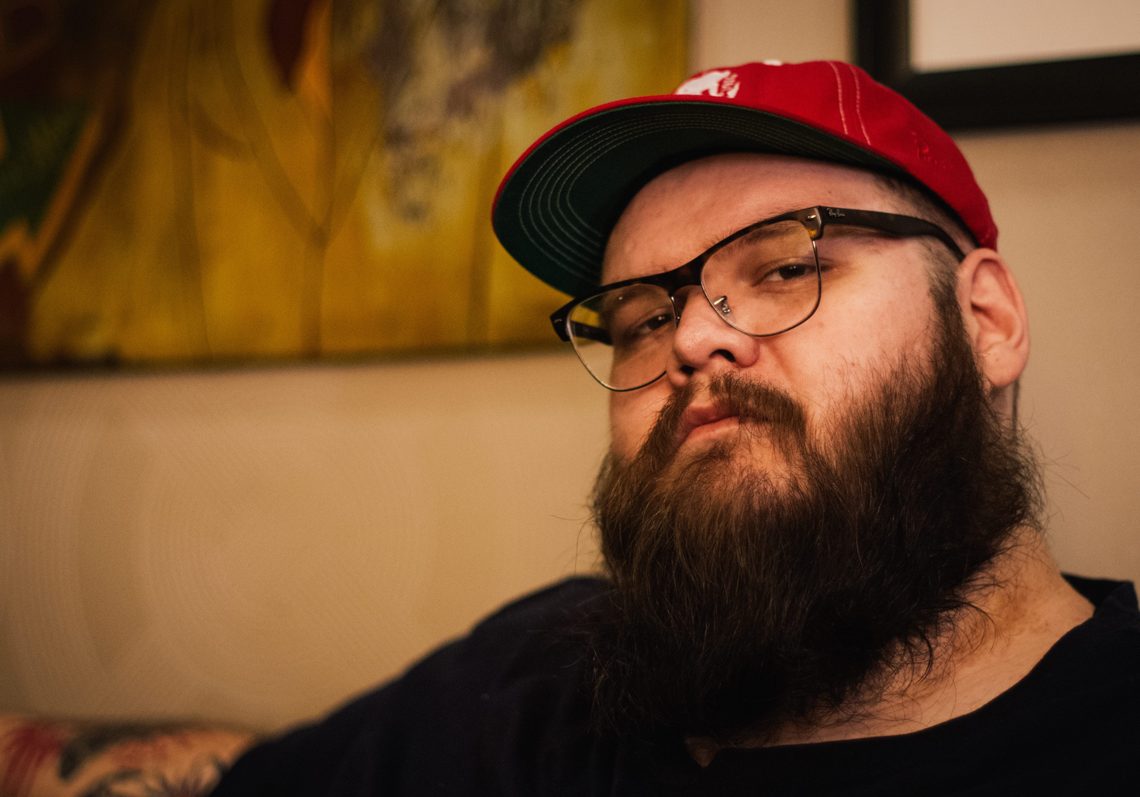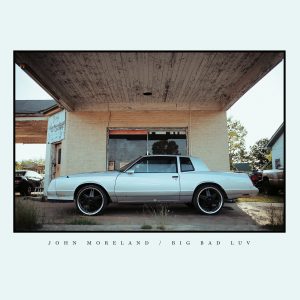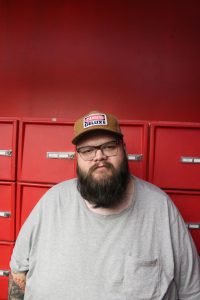By Mike Ethan Messick
A soulful, gritty-voiced mountain of a man hailing from Tulsa, Oklahoma, John Moreland has gradually built up a catalog of heartbreakingly memorable songs. And slowly but surely, the world is catching on. His 2013 sophomore solo set, In The Throes, was definitely a breakthrough, attention-wise, though by then Moreland had already been honing his craft in some form or another for over a decade. But in recent years he’s gone from under the radar best-kept-secret to critically (and peer) lauded next-big-thing in the sea of boats lifted by the rising tide of interest in singer-songwriters that loosely fit the Americana genre, making music with country-folk roots but a rock ’n’ roll sense of ambition and abandon. The latter is something the still-young Moreland knows a thing or two about from his teenage forays into hardcore punk. The raw emotions, uncompromised vision, and road-less-travelled ethos remain, even if the volume’s gone down in favor of more subtle soul-baring and a distinctly wise and mournful way with words.
The punk-turned-troubadour’s last album, 2015’s High On Tulsa Heat, only heightened the buzz stirred by In the Throes, and since then Moreland has plied his trade on late-night network TV, had his music featured on the hit show Sons of Anarchy, and most importantly won over thousands of fans out on the road, one (increasingly large and crowded) roomful at a time. His newest album Big Bad Luv — heralded by a single, “Sallisaw Blue,” that’s as brisk and swaggering as anything Moreland’s offered up in his solo years — still maintains that melancholy edge, but it’s shot through with hope and affection as well. Recorded in Little Rock with a crew of Moreland’s favorite Tulsa musicians and a valuable guest shot from Lucero’s Rick Steff on piano, the album’s as open-hearted and ambitious as we’ve come to expect. (Big Bad Luv will be released May 5 on 4AD, but you can preorder it at the link below.)
Moreland joined us over the phone on the long road from the East Coast to California’s Stagecoach Festival, where he’d be sharing the stage with everyone from Dierks Bentley to Jerry Lee Lewis to .38 Special. Cordial and well-spoken, he’s less a road-story raconteur than a hard-working artist on a mission, with values as steadfast and clear as his lyrics are poetic and verbose.
So I know I’m catching you on the road … where are you headed right now?
We’re headed out to Indio, California for the big Stagecoach Festival. We played out in Charleston, South Carolina on Sunday, I think it was, so we’re making that full continental U.S. drive again.
Career-wise, it seems like you’ve really been picking up steam headed into this new album. I’m sure it’s exhausting sometimes, but what’s the most exciting part?
I mean, really, I just love being out playing the shows. We were having a conversation about that just last night in the van. We were driving and I was like, this part right now — just being in the van, driving across the country — that might be my favorite part, really.
Are you still mostly touring solo?
Right now it’s a duo. It’s just me with John Calvin Abney playing guitar and piano, but hopefully we’ll bring the rest of the band in after a short while. Soon as we can.
The early buzz on this new one was that it’s a happier album than usual. It had a catchy first single with “Sallisaw Blue,” and got a good-natured title with Big Bad Luv. Was that the approach? Upon several listens, it sounds as emotionally complex as anything else you’ve done.
Yeah, I wasn’t really trying to do anything too much different, just continuing what I do. I was trying to write songs that felt good, felt right, felt relevant to me in my life at this moment. I think some people were calling it a “happier” album, but I think that’s an oversimplification. It’s happy and it’s sad, just like all the rest of my work, just like life itself.
I understand that you were damn near under duress on some of the songwriting here, timeframe-wise.
Ha ha, yeah, for sure. The last session for it I booked without any songs written! So yeah I was just trying to figure out what to do, when I ran into Rick Steff [of Lucero] in Memphis. And he — well, I’ve always loved his piano playing, so I asked him if he could play on it, and once he agreed that was kind of the push I needed to finish up the writing. So I went home and wrote the rest of the songs, and went and recorded them the week after that.
Like most songwriters, you probably get tired of being asked this, but what’s your usual process for songwriting? Seems like there’s a lot of approaches out there for getting someplace good.
Yeah I don’t think I even have a “usual” approach; it’s so different every time, but I’ll get it done any way I can. Whatever gets the song done is fine with me, but it doesn’t always happen the same way.
You’ve gotten a ton of acclaim for your songwriting, especially over the last few years. Has the mainstream come calling yet, looking for material or co-writes?
Not really … I’ve had a couple of inquiries about that, but it’s not really something I’m interested in, so I’ve always shut it down pretty quick when it comes up.
Your writing and delivery feel very natural, but the influence is kind of hard to pin down. When you started writing songs, were you emulating anyone in particular?
I think mostly I was trying to emulate Steve Earle at first. But that’s how it goes I think, when you start out you’re really wearing your influences on your sleeve, and the longer you do it, it sort of becomes your own thing and more natural to you. When I’m writing nowadays, it’s not that I don’t have any influences, but I’m not really thinking about that near as consciously as I was when I was younger. Whatever comes out of me, it’s fine.
Oklahoma’s got a great musical tradition. Lots of serious troubadours and influential bands have come out of a place that gets written off as “flyover country” sometimes. Who did you see around you that made an unconventional but successful music career really seem like a possibility?
Yeah, Oklahoma’s still home to me. I live out in Tulsa. But you know, the kind of music I started playing, I was in hardcore bands when I was really young. It was really difficult, almost impossible, to make a career doing that kind of music … almost everybody, you tour, and then you come home and work at a restaurant or whatever. Whatever kind of job you can get that’ll let you off to go tour and come back and still have work. And that’s kind of what I thought I’d always be doing. So the first time I really realized that it was possible for a regular person who wasn’t some famous rock star, playing arenas and shit, to make a living playing music was when I found artists like Steve Earle, and Gillian Welch, a lot of the music I discovered that’s now called “Americana.”
Could you tell me a little about those early days of your career? You’re still a young man, but there’s already a lot of history there with your past bands.
Really, I started playing in bands when I was 13. When I was a teenager I was into hardcore, that’s what I was playing, and honestly it was just great for me. Because the whole idea is to do it yourself; it was a scene that was kind of founded on the principles that nobody in the mainstream music business is gonna help us do anything — we have to figure out how to do it ourselves. And that turned out to be really beneficial for me down the line, because I think in a way that — no matter what kind of genre you’re playing now — everybody is kind of having to do that. Every new band that starts now is a punk band, in that kind of way. I wouldn’t have a career if I didn’t learn that stuff at an early age.
It looks like you’ve got a fair amount of European dates coming up, and not just in the U.K.. For someone whose material is so invested in the language, what’s it like connecting with a crowd for whom English isn’t the first language?
Yeah, it’s always surprising, you know? I think in general in Europe, the places where English is more common, like in Scandinavia where English isn’t the first language but it’s pretty common for people to speak it well as a second language — my kind of music catches on a little more there. But I’m still surprised that in places like France and Germany where English is less common, people are still enjoying my music and coming out to shows. So I don’t know why that is, but I sure am thankful for it.
Back here in the States, what are some of the career moments over the last couple years that really jump out at you? It seems like it’s been a pretty steady climb; I’m just curious what some of the watershed moments have been from your perspective.
I don’t know, really. I don’t think there have been … actually, I take that back. I’m sure there have been those moments. I think that just from my perspective, it’s really hard to tell when I’m right in the middle of it all. To me it feels more like a very long series of small steps and then over several years it starts to add up to something.
When you’re on your way up, there’s bound to be a lot of advice coming in, solicited and otherwise. No need to name names if you don’t want to, but what’s some of the worst advice you’ve gotten so far?
You know, I can’t even think of any bad career advice yet. I’ve always tried to put out that vibe that I’m going to do my thing, and there’s really nothing anybody can do about that, and I’ve been really lucky to work with people who understand that and let me do my thing. So yeah, I haven’t had much pushback, much “you should do this, you should do that … ” — I haven’t encountered it yet.
And on a brighter note, what’s the best advice you’d give someone who was looking up to you and your music and seeing a glimpse of their own possibilities?
The advice I give everybody is just to do the best work you can. Write the best songs you can, make the best music you can, and go out and play it as much as you can in as many places as will have you. That’s all you can do, I think. I remember being in that position where I was wondering how you do it, and I would ask people and they never really had anything to tell me. [Laughs] And I found that kind of frustrating at the time, but now I kind of understand it. Even when you’re doing it, you don’t really know how you’re doing it, you just have to be persistent and keep doing your thing. And you have to love it, because you know … if you don’t, the reward that you’re looking for might never come. The reward has to be the work itself.
And things are better than they used to be, but there’s still a world of people out there who don’t know what to make of music that doesn’t fit into a neat box of country, rock, hip-hop or whatever. If one of them asks you what kind of music you’re making, what do you tell them?
Rock ’n’ roll. Yeah. Rock ’n’ roll.








No Comment